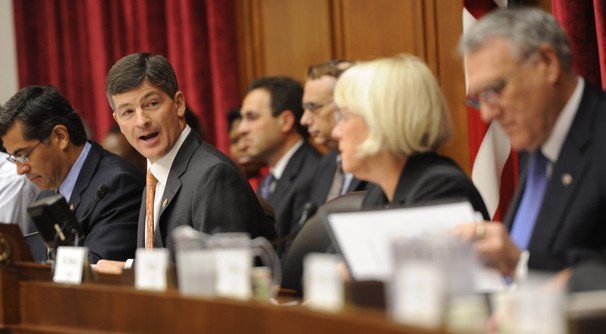
After supercommittee fails, parties pin hopes on 2012 elections
David A. Fahrenthold and Rosalind S. Helderman,
On Monday, Washington finally gave up on the fantasy that 12 members of a divided Congress would eventually agree on a historic debt-reduction compromise, if they just spent enough time together in small rooms.
It didn’t work. There were late-night bull sessions, early-morning bike rides and group dinners. The panel’s members shared coffee and granola bars. But there was little dealmaking and never enough progress on any idea for them to fight over actual details.
One key member of the committee said that the consequences of failure were never imminent enough to move the sides toward a compromise.
The fact that the automatic cuts resulting from the panel’s failure would not kick in until 2013 was a key barrier to a deal, said Sen. Rob Portman (R-Ohio). “I think it made it easier to avoid making some of the tougher decisions,” he told reporters Monday.
Now the committee is dead, but each side has a new dream to cling to: that the elections of 2012 will help solve the problems that the “supercommittee,” and the entire Congress before it, were unable to fix.
But these new dreams are grounded in the same partisanship that doomed the supercommittee. Both parties are hoping for enough wins in 2012 to be able to pass their own deficit-cutting plan without having to compromise with the other side.
What seems more likely, observers say, is more divided government, requiring even more compromise.
“The country is severely divided. That almost certainly means a closely divided Congress, and that means more difficulties,” predicted Lee Hamilton, a Democrat who served in Congress for 34 years and now is the director of the Center on Congress at Indiana University.
As the committee’s failure went from apparent to official on Monday, the parties turned to the election.
On the presidential campaign trail, GOP candidates said the solution is to replace President Obama. “Our president has had no involvement in the process,” said former Massachusetts governor Mitt Romney (a claim the White House disputed Monday). “I find that extraordinary.”
The supercommittee’s demise could have been scripted at its beginning in August. The problem was taxes. Democrats wanted higher rates for the wealthy if entitlements were to be cut. Republicans said that would be a recipe for economic stagnation.
The only thing the committee could agree on, at the end, was a 270-word statement, issued by the co-chairmen, that said they’d given up.
“We end this process united in our belief that the nation’s fiscal crisis must be addressed,” said the two people charged with addressing it.
The committee, created after the summer’s debt-ceiling crisis, began with bipartisan pledges of hard work and open minds. “This committee has the opportunity to show the American people we can still come together, put politics aside and solve a problem plaguing our country,” said Sen. Patty Murray (D-Wash.), one of the two co-chairmen, at the group’s first meeting.
Members spent hours sequestered in an underground room in the Capitol Visitor Center, and more hours in small groups in one another’s offices. But aides said these conversations often circled, again and again, around problems of taxes and spending.
It was only after three of their four months had elapsed that somebody put a bid on the table.
Democrats offered a plan to cut the deficit by $3 trillion. That offer included $500 billion in cuts to health-care programs, plus $1.3 trillion in new revenue. Later, Republicans offered a $1.2 trillion plan. It included $300 billion in new tax revenue, achieved by capping deductions and closing loopholes, but lowering overall tax rates.
Soon, both parties heard from their respective bases. One union leader excoriated Democrats for offering to tinker with Social Security benefits. Some conservatives recoiled when Republicans offered to increase revenue.
On Monday, each side used the committee’s failure to argue that they should be given control of both houses of Congress. Today, the GOP controls the House, and Democrats the Senate.
“The supercommittee has unmasked the Republicans,” said Rep. Steve Israel (N.Y.), the head of the Democratic Congressional Campaign Committee. “They have proven that they are too extreme and that they care more about millionaires than Medicare.”
“We’re going to have to get serious about cutting,” said Thad Viers, a lawyer and a Republican candidate for Congress in South Carolina. “And it just seems the Democrats . . . all they want is more revenue.”
To be able to force its agenda through, one party would probably have to win the White House, the House and a filibuster-proof, 60-vote majority in the Senate.
And election watchers say that’s not happening.
After a series of elections in which politicians touted their party purity, a smattering of 2012 candidates are trying to sell voters on their willingness to make deals. That may play better now, after such a high-stakes failure.
Even if one party was sufficiently successful at the polls in 2012 to force its ideas into law, Washington insiders know that even that would not be the end of it.
“Sure, we’ll cut and we’ll cut and we’ll cut,” said Rep. Thomas J. Rooney (R-Fla.), imagining a total GOP victory in 2012. “And the Democrats will start to run against it right away.”
Staff writers Aaron Blake, Amy Gardner, Scott Clement and Paul Kane contributed to this report.

